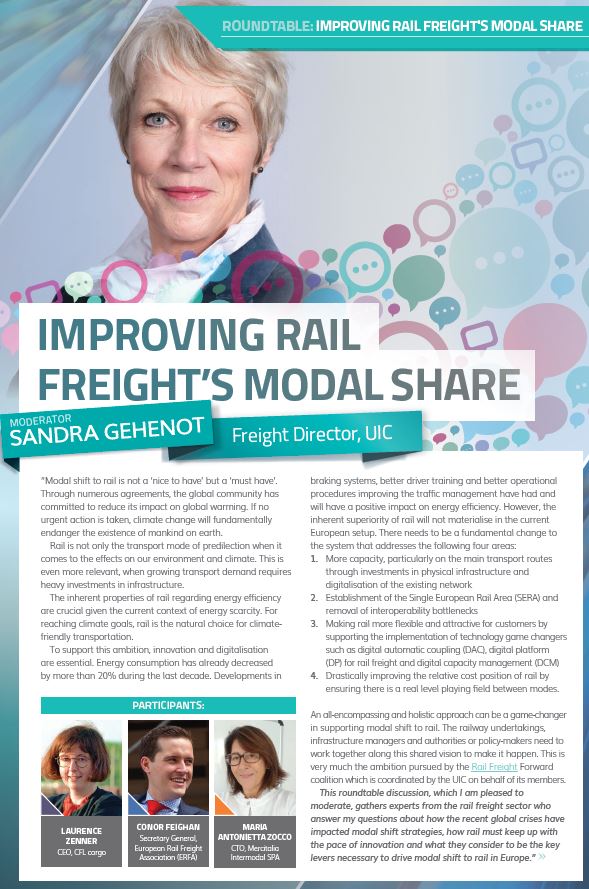Roundtable: Improving Rail Freight’s Modal Share
25 April 2023
Shares
Moderated by Sandra Gehenot, the UIC’s Freight Director, participants from CFL cargo, ERFA and Mercitalia Intermodal share their views on what key levers are necessary to drive modal shift to rail in Europe.
Sandra Gehenot, the UIC’s Freight Director, writes:
“Modal shift to rail is not a ‘nice to have’ but a ‘must have’.


Through numerous agreements, the global community has committed to reduce its impact on global warming. If no urgent action is taken, climate change will fundamentally endanger the existence of mankind on earth.
Rail is not only the transport mode of predilection when it comes to the effects on our environment and climate. This is even more relevant, when growing transport demand requires heavy investments in infrastructure.
The inherent properties of rail regarding energy efficiency are crucial given the current context of energy scarcity. For reaching climate goals, rail is the natural choice for climate-friendly transportation.
To support this ambition, innovation and digitalisation are essential. Energy consumption has already decreased by more than 20% during the last decade. Developments in braking systems, better driver training and better operational procedures improving the traffic management have had and will have a positive impact on energy efficiency. However, the inherent superiority of rail will not materialise in the current European setup. There needs to be a fundamental change to the system that addresses the following four areas:
- More capacity, particularly on the main transport routes through investments in physical infrastructure and digitalisation of the existing network
- Establishment of the Single European Rail Area (SERA) and removal of interoperability bottlenecks
- Making rail more flexible and attractive for customers by supporting the implementation of technology game changers such as digital automatic coupling (DAC), digital platform (DP) for rail freight and digital capacity management (DCM)
- Drastically improving the relative cost position of rail by ensuring there is a real level playing field between modes.
An all-encompassing and holistic approach can be a game‑changer in supporting modal shift to rail. The railway undertakings, infrastructure managers and authorities or policy-makers need to work together along this shared vision to make it happen. This is very much the ambition pursued by the Rail Freight Forward coalition which is coordinated by the UIC on behalf of its members.
This roundtable discussion, which I am pleased to moderate, gathers experts from the rail freight sector who answer my questions about how the recent global crises have impacted modal shift strategies, how rail must keep up with the pace of innovation and what they consider to be the key levers necessary to drive modal shift to rail in Europe.”
Participants:
- Laurence Zenner, CEO, CFL cargo
- Conor Feighan, Secretary General, European Rail Freight Association (ERFA)
- Maria Antonietta Zocco, CTO, Mercitalia Intermodal SPA
Download your copy of this Roundtable now.



